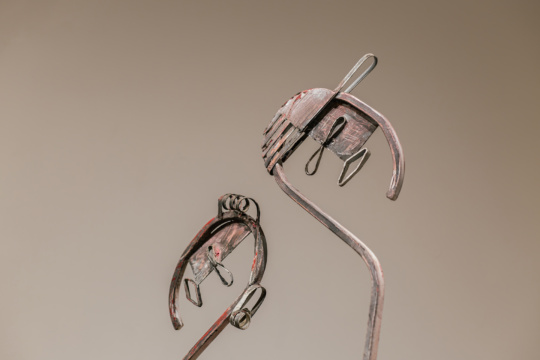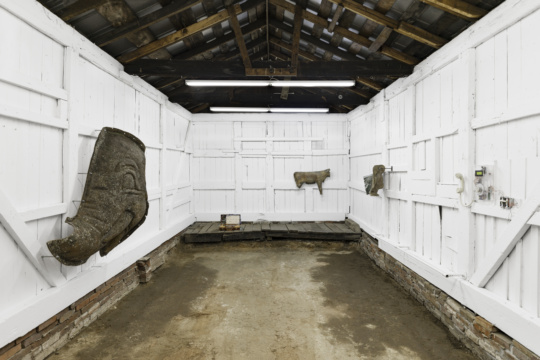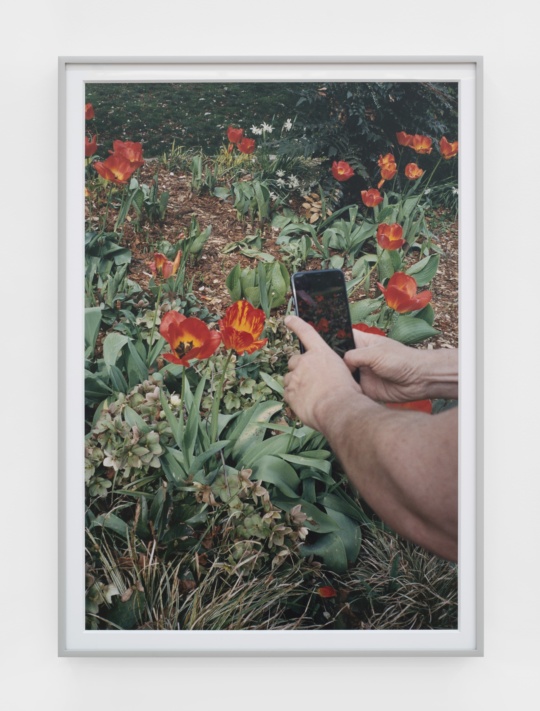[cont.]
The church was not as large as she had expected but it was full. Odessa had a clear view of the brother-in-law sitting by the aisle on the front row with Rina’s two daughters boxed in between him and his wife. The older daughter, Barbara, had found the body but showed no signs of trauma or even grief. She sat up straight, peering around herself, glaring at everyone looking at her, completely ignoring her younger sister. Odessa was surprised to note that Jenna, even with her head bowed as she sobbed quite quietly into a handkerchief, was conspicuously taller than her older sister. My, she had really bolted up in the past six months. Roger was banished further down the row beyond his niece and nephew. The redheaded assistant was not there and Odessa and everyone who knew anything about Roger kept turning around to see if she was hiding somewhere in the back. Her friend, the senior museum curator, whispered that the brother-in-law was the executor of the will as well as the one in charge of the girls’ trust funds. Rina had essentially written her husband out of her will so everyone was expecting a legal battle.
“Those poor, poor girls,” Odessa whispered to her friend.
“Well, certainly not poor financially. And they won’t have to put up with any hoopla here for long. The younger girl is being shipped off to a private boarding school. The older daughter escapes next fall. She’ll attend Sarah Lawrence.” Odessa made a mental note to ask Maggie, who would be a senior there, to befriend her. Even if Barbara wasn’t showing signs of grief, losing a mother is always catastrophic. No mother should abandon her children this way. It’s really unforgivable.
It was an open casket affair. Rina, dressed in the palest pink with a white satin blouse, was surrounded by cream colored roses and orchids, the color, someone whispered, of those at her wedding. She definitely left a good looking corpse. Even in death, her hands looked so soft, her hair was perfect. The mortician had done her proud.
It was such a waste, the needless death and the life too for that matter. Rina had the great good fortune of being born beautiful, rich, and reasonably intelligent but never did piddly with any of it. She had floated through life on a bubble of adoration. Beautiful people can so easily get away with this. So many studies proved that the beautiful are automatically treated differently, more deferentially than others. Add major money to the mix and it was no wonder she was treated like a pampered princess.
Why would someone with everything commit suicide? It really made no sense. Why didn’t she ask for help?
Maybe asking for help wasn’t part of her programming. All her life good things just fell into her lap without the slightest effort from her. The four exhibits the museum director mentioned in her eulogy were in fact organized by her former assistant currently working at the Louvre. The twelve major paintings the museum acquired during her tenure were gifts from friends of her parents, nothing she expended any effort in obtaining. Someone had always automatically been there to throw a cloak over the mud puddles of life. She never had to ask.
Odessa chided herself for judging so harshly. After all, she hadn’t been born spectacularly beautiful like Rina. It must be incredibly difficult to age when your whole life is measured by your beauty. And skin can only be stretched so far. Add to that, poor Rina had zero sense of humor. Even basic irony sailed straight over her lovely head. Aging gracefully is so much easier with a sense of humor to fall back on.
It’s always difficult, isn’t it, to determine the edge between speaking ill of the dead and speaking the truth. The speakers at her funeral did neither. They repeated all the usual platitudes. She wondered if some of them had actually known Rina. No one shared a personal story; no one had a poignant anecdote. No one chose to put her life into any sort of focus. Only one even mentioned her famous parties. Their words could equally describe half the audience, at least the ultra rich half. It’s like this was just a rehearsal for a funeral, everyone simply reading their part, not investing any energy or conviction in what they were saying. Jenna, the younger daughter, was the only person in the whole blessed church who even looked sad about her death.
Maybe they just didn’t know what to say. Suicide always leaves behind a legacy of guilt. After all, none of them had paid enough attention to notice how bad she was hurting.
Just outside the door, blinded by the paparazzi’s flashing cameras, Odessa bumped into Nolan, the publisher of a small local arts magazine.
“This way,” he told her, guiding her through a thicket of expensive cameras. “It’s so easy to spot the reporters, isn’t it? Badly dressed among the rich and famous, scurrying after the beautiful to find some slippage in veneer. Society as a whole has become completely obsessed with physical beauty.”
Odessa scoffed politely, “Nolan, please name any era which wasn’t obsessed with physical beauty. I can’t think of a single one. The definition of beauty might shift a little here and there but beauty itself has always been highly prized. After all, sexual attraction is built on the physical, so the survival of our species is contingent on lusting after beauty.”
Nolan laughed. “Or what’s readily available. But I know what you mean. It’s just ironic that physical beauty is an ultimate good while beauty in art is suspect.”
“Maybe,” she offered, “beauty is so suspect in art these days because physical beauty is so easily manufactured now. At least half the men and almost all of the women at the funeral have been surgically altered. Ugly just seems more honest and art treasures honesty.”
As they strolled to the parking lot, he inquired if she might be interested in writing Rina’s obituary for the next issue. She said she’d think about it.
At home, she did think about it, particularly his comment that beauty was now suspect in art. She and Maggie discussed it on the phone. For much of history, Maggie explained, beauty in art was almost incidental. The purpose of art was to act as a vehicle for speaking with a supernatural power: art objects either carried power in themselves or acted as portals to the divine. These objects were believed to have the power to control lives and events so art was a way of trying to rig fate, a way of fighting the fear of uncertainty. Any beauty was there simply as an amplified offering, an additional appeasement to the gods, a better bribe. Starting with the Egyptians, art was imbued with a set of mathematical proportions which were repeated as rigidly as incantations or prayers. These proportions were designed to please the gods by attempting to mimic the perfection of the gods. Until science disproved it, the cosmos in Christianity was formed of perfect circles: the sun circled the earth, the moon circled the earth. All these perfect circles reflecting the perfection of god’s creation. Leonardo’s drawing of the man within the circle and the square is an example of that world view. Harmony in art mirrored the harmony of the celestial bodies. The celestial bodies in turn reflected god’s smooth and orderly perfection. Harmony was beauty was truth was god-like.
Beauty, harmony and truth began as a quest to cajole the divine for mercy and gradually became tools in maintaining a social order. There is certainty and control when beauty is proclaimed to be this one thing; truth is this one thing; harmony is this one way of living. Contemporary art, mirroring the rise of science and its culture of questioning, was about clawing through the presuppositions which form our comfort zone, about testing the accepted, to reveal inner truths, hidden truths which so often were harsh. “A terrible beauty is born.” A beauty not founded on smooth and orderly.
Odessa always enjoyed listening to Maggie talk about art. Half the time she thought Maggie overanalyzed everything; but she never criticized her: given how she was raised before they adopted her, thoughts were about the only glue she had to keep her life together.
Dennis’ suggestion was far more practical: read a bunch of obits. And it was good advice. In his eulogy for Caesar, Antony proclaimed “the good is oft interrèd with their bones.” The modern obituary, she observed quickly in her research, had reversed the polarity, sugar coating failures while magnifying successes. No longer cautionary tales, obituaries now avoided deep truth for happier appearances. Odessa’s first draft of the obituary, though, was blunt.
Stating that Rina remained in the same position as an associate curator for twenty one years in the museum her parents financed was true. Stating that Rina never volunteered for any charity, never personally purchased any art work of any era, never used her influence to promote the arts in any way was true. Stating that Rina committed suicide was also true, even though no note had been found. And the truth shall set us free, right? But Odessa kept thinking about the two daughters left with their philandering father. She couldn’t let her disappointment in Rina be so obvious. It would be brutal to the daughters, like tromping on kittens. In the end, kindness trumped truth.
Four
Katrina Whitely Trumbell was born into an influential family in Greenwich, Connecticut. Her maternal grandfather was governor of the state for one term; her paternal uncle was an economic advisor to President Reagan. Her father Thomas began in aeronautics and then expanded his influence into real estate. While working on her PhD in Art History at Columbia, she met and soon married Roger Trumbell, a young architect. Upon her graduation, the couple moved to his home town, Los Angeles, where he opened his own firm, now widely considered to be one of the three top architectural firms in the country. Famous for her porcelain beauty and the elaborate parties so essential to her husband’s success, she was also a curator who compiled several noteworthy exhibits including the first exhibit of Pierre-Paul Prud’hon’s drawings on the West coast. Katrina Trumbell died last month at age 49. She is survived by her husband and two daughters, Barbara and Jenna.
……………………..
Return on Wednesday for the next chapters of Just Like Suicide.




